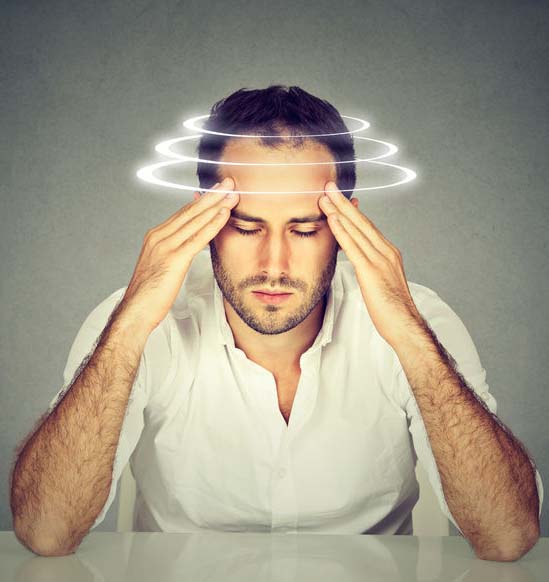
Can Myofascial Release Help Tension Headaches?
Tension headaches are the most common type of headache. Sometimes it is called a tensional headache or a stress headache. It is pain or discomfort in the head, scalp, or neck, and is often associated with muscle tightness in these areas.
Other names for tensional headaches are: Tension-type headache; Episodic tension-type headache; Muscle contraction headache; Headache – benign; Headache – tension; Chronic headaches – tension; Rebound headaches – tension.
Tension Headache Causes
Tension headaches occur when neck and scalp muscles become tense or contract. The muscle contractions can be a response to stress, depression, head injury, or anxiety.
Any activity that causes the head to be held in one position for a long time without moving can cause a headache. Activities may include typing or other computer work, fine work with the hands, and using a microscope. Sleeping in a cold room or sleeping with the neck in an abnormal position may also trigger a tension headache.
According to the World Health Organization (WHO), one in every 20 adults around the world suffers from a headache each day, and nearly half of adults suffer from some sort of headache disorder. For the most part, a headache is not life-threatening; however, it can cause substantial personal suffering and have a significant impact on a person’s quality of life.
Many people start off with a tension headache, but then it develops into a migraine. Tension headaches usually do not cause nausea or vomiting. This is also a symptom of migraines. People with tension headaches are frequently misdiagnosed or self-diagnosed with migraines when in fact they are experiencing a tension headache. One piece of good news is that tension headaches are not associated with brain diseases.

Triggers include:
- Physical or emotional stress
- Use of Alcohol
- Caffeine (too much or withdrawal)
- Colds, the flu, or a sinus infection
- Dental problems such as jaw clenching or teeth grinding (possibly TMJ)
- Eyestrain
- Excessive smoking
- Fatigue or overexertion
The headache pain may be described as:
- Dull, pressure-like (not throbbing)
- A tight band or vise on or around the head
- All over (not just in one point or one side)
- Worse in the scalp, temples, or back of the neck, and possibly in the shoulders
The pain may occur once, constantly, or daily. Pain may last for 30 minutes to 7 days. It may be triggered by or get worse with stress, fatigue, noise, or glare. There may be difficulty sleeping.
To get rid of a tension headache, people try to massage their scalp, temples, or the bottom of the neck. Massage will only provide temporary relief if any.
Tension Headache Treatments
The most effective way to diagnose a tensional headache is the exploration of trigger points in the muscles of the neck and shoulder areas.
Traditional medicine set as the main goal that the patient learns how to treat symptoms right away, usually it involves taking medications that include over the counter pain medicine, muscle relaxers and antidepressants. All these medications have side effects as:
- Rebound headaches: Headaches that keep coming back due to the overuse of pain medication.
- Liver damage as a result of too much Acetaminophen.
- Stomach irritation or Kidney damage caused by too much Ibuprofen or Aspirin.
Instead of relying solely on medicine with many side effects and only temporary relief, it’s important to identify the headache triggers and avoid those activities. A few common activities are “changes in lifestyle” which include work activities, family activities or health activities as exercising.
Tension Headaches Relief with Myofascial Release

Myofascial Release offers a completely different approach to tensional headaches. We begin by treating the cause instead of the symptoms and giving the possibility to maintain your regular lifestyle. Myofascial Release will release the soft tissue tightness causing the tension at your scalp. As it was mentioned above the tension at the scalp muscles is caused by tension in neck, and shoulders. The tension at the shoulders and neck from the Myofascial prospective might been caused by other soft tissue restriction on close or distant body parts, as well as body/joints misalignments or postural issues.
By conducting an initial evaluation, a myofascial release provider can identify the problems before treating you. Since every body is different, symptoms may be similar but the causes varies from person to person.
Since Myofascial Release is a whole-body approach treatment it offers treatment not only to the areas where the symptoms are present but to the entire body, assuring all the restrictions are released.
Wholistic PT offers Myofascial Release as a treatment plan for tension headaches. We’ve helped many patients suffering from tension headaches to find them much sought-after relief. In some cases, patient have opted for a treatment plan that includes Health coaching as well, in those cases patients felt that they needed more guidance adopting a healthier lifestyle that will improve the overall wellbeing.
If you’re tired of the pain and ready to explore a more holistic and whole-body approach, contact us today for a consultation for tension headache relief.
PRICING
Initial Evaluation & Treatment – $250
1-hour sessions – $125
1.5 hour sessions – $187.50
2-hour sessions -$ 250
Intensive treatment packages are available.
Ask if interested
In cases where a patient has a chronic condition and/or multiple areas to work on, a longer session will offer extra time to address and treat the areas involved.
- Accepted Payments: Visa, Mastercard, American Express, checks and cash.
- Payments are made at the time of service.
- Fees for debit and credit cards may apply.